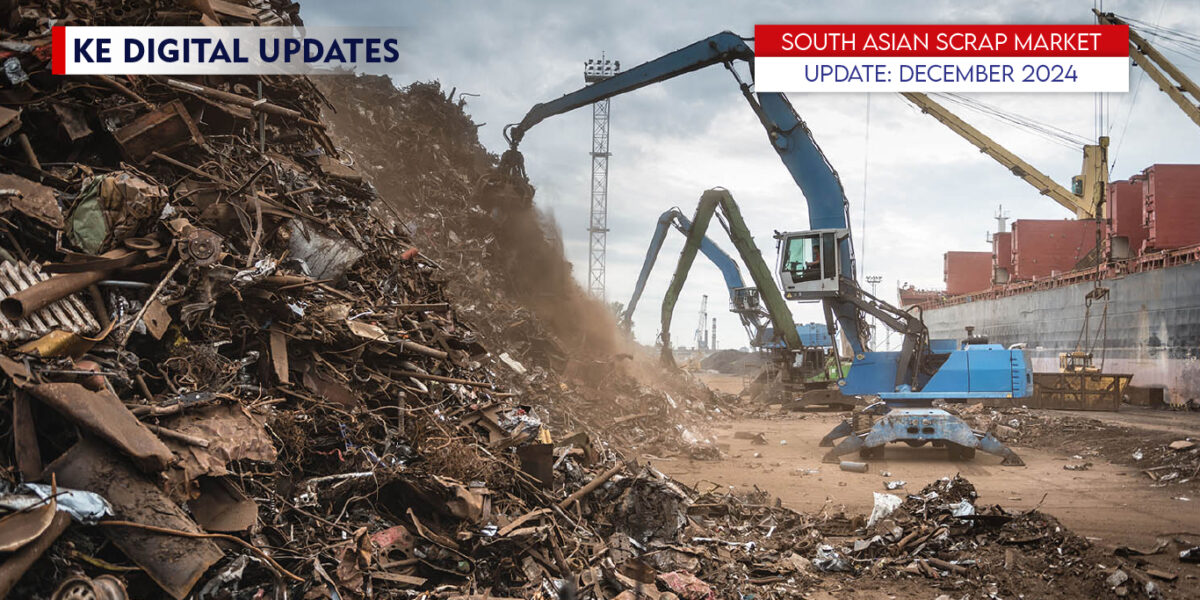Published on December 10, 2024
The global scrap market has been experiencing varied activities across different regions as the year ends. This detailed analysis provides insights into the market dynamics in India, Pakistan, Bangladesh, and Turkey. Each region faces unique challenges and trends shaping their respective scrap markets.
India:
In India, buyers displayed mild interest in imported scrap, influenced by rumors of a potential steel import duty. This speculation fueled expectations of price increases, but buyer confidence remained low due to weak domestic steel demand. As a result, the appetite for large volumes was limited.
Price Trends
UK-origin shredded scrap was assessed at $383 per tonne CFR Nhava Sheva, a slight increase of $5 per tonne compared to the last close. Indicative offers ranged between $385 and $390 per tonne CFR, while buyers targeted lower levels around $378 to $380 per tonne CFR. This cautious approach reflects the uncertainty and hesitant market sentiment among Indian buyers.
Pakistan:
Pakistani buyers engaged in restocking activities before the Christmas and New Year holidays. However, major deals were scarce, with limited bookings reported at varied prices based on yard and quality. The overall market sentiment was subdued, with the finished steel market remaining weak.
Market Challenges
Mills were operating at reduced capacity, ranging from 30% to 40%, indicating significant underutilization. Rebar prices were reported at PKR 245,000 to 250,000 per tonne ($880 to $898 per tonne), while local scrap traded at PKR 140,000 to 142,000 per tonne ($503 to $510 per tonne).
Price Trends
UK-origin shredded scrap indicates an increase of $4 per tonne to $384 per CFR Qasim compared to the last closing. Offers stood at $385 to $390 per tonne CFR from premium yards, while others were around $380 per CFR. This indicates a slight upward price trend, but the overall market activity remained muted.
Bangladesh:
Bangladeshi buyers remained quiet due to sluggish steel demand, driven by stalled infrastructure and construction activities. Persistent challenges in opening letters of credit (LC) further constrained market activity, limiting the ability of buyers to secure scrap imports.
Price Trends
UK-origin shredded scrap was assessed at $385 per tonne CFR Chattogram, up by $5 per tonne compared to the last close. Indicative offers for shredded scrap from Singapore, Malaysia, and Indonesia stood at $390 per tonne CFR Chattogram, while HMS (80:20) from the same origins was offered at $370 per tonne CFR. African HMS (80:20) was heard at $350 per tonne CFR.
Turkey :
The Turkish imported scrap market remained subdued, and prices were stable. Both buyers and sellers exhibited limited trading interest, reflecting the cautious market sentiment. Turkish mills held back on scrap purchases due to weak end-product sales expected for January.
Price Trends
US-origin HMS (80:20) bulk edged by $1 per tonne to $337 per CFR Turkey compared to the last closing. Indicative prices hovered around $337 to $338 per tonne CFR. Sellers faced challenges securing material flows to docks at current procurement prices, while mills leveraged the situation to pressure recyclers. Market sentiment leaned bearish, expecting further price drops as suppliers may be compelled to sell to sustain operations.
Conclusion
The global scrap market is navigating a period of cautious activity and varied regional trends. While India and Pakistan showed some price increases and restocking activity, the overall market sentiment remains cautious. Bangladesh’s slow demand and Turkey’s muted market reflect the ongoing challenges in the scrap sector. As market participants adjust to these dynamics, careful navigation and strategic planning will be essential to manage potential price fluctuations and market uncertainties.


